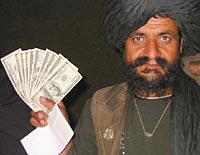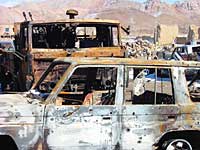|
Afghanistan Raid a Mistake, U.S. Military Says
Officials Concede Error, Compensate Survivors of Raid Last Month
 Listen to Steve Inskeep's report on the deadly U.S. raid on Oruzgan. Listen to Steve Inskeep's report on the deadly U.S. raid on Oruzgan.
 View a photo gallery of the aftermath of the U.S. attack on Oruzgan, Afghanistan. View a photo gallery of the aftermath of the U.S. attack on Oruzgan, Afghanistan.

|
|
Bari Gul, above, says his brother Haji Sana Gul was a member of a local disarmament commission, with no connection to the Taliban. His brother was killed in the raid on Oruzgan -- and last week, Bari Gul was paid compensation: 10 American $100 bills.
Photo: Qudratullah Ahmady for NPR
 view the photo gallery view the photo gallery
|
Feb. 4, 2002 -- The U.S. military has conceded that a major raid in Afghanistan was a mistake, NPR's Steve Inskeep reports for Morning Edition.
American soldiers believed they were attacking an al Qaeda hideout in a remote village last month, but residents claim the American soldiers killed at least 18 people who were loyal to the new government.
Pentagon officials say they are still investigating the incident, but senior Afghan officials say the American military has already expressed regret. Inskeep investigated the deadly raid at the village of Oruzgan, and discovered that the families of the dead have received compensation from the United States -- paid in American $100 bills.
According to villagers, U.S. soldiers arrived by helicopter late at night and attacked two targets. At the first target, the district government offices, they destroyed ammunition that once belonged to the Taliban, killed two guards and captured 27 prisoners.
 |
|
"They arrived at the school, they shot. (The U.S. soldiers) started firing, and it was continuing, and it was very strange for me, and the speaking of English also was continuing, and I thought... what an amazing thing. These were our friends. What are they doing?"
Oruzgan resident Abdul Ali, to a translator
|
 |
But according to Afghan officials, the Taliban abandoned the offices weeks ago. Residents say U.S. soldiers captured gunmen loyal to a local politician, plus six common criminals they pulled out of the local jail.
The second target was a former school building. Armed men were living there, and the U.S. military believed the building had become an al Qaeda hideout. But according to local residents and officials, the building was actually the headquarters of a disarmament commission, where officials were collecting weapons from the countryside. The officials had been appointed by the new anti-Taliban governor, Jan Mohammed Khan.
The morning after the raid, a disarmament commission official named Arghawani says he found vehicles full of bullet holes, gaps blown into the walls and bodies strewn across three classrooms. Oruzgan residents say some of the dead men's wrists were bound with plastic handcuffs. Khan says the handcuffs are evidence that some of the prisoners were tied up and shot.

|
|
Some of the trucks and other vehicles villagers claim were wrecked in the attack on the school, now the headquarters of the regional disarmament commission.
Photo: Steve Inskeep, NPR
|
Many of the villagers say the Americans attacked buildings that had become headquarters for two competing political factions. Each faction accuses the other of feeding false information to the U.S. military, tricking the soldiers into destroying its opposition.
Other Afghan officials describe the raid not as a conspiracy, but a mistake -- an "Afghan mistake," one official says, suggesting that Afghans inadvertently gave the American forces flawed intelligence. But the U.S. military has yet to offer an explanation. At the Pentagon, senior officials insist they remain largely in the dark about what their own soldiers did, and why.
 Browse for more NPR stories on disarming Afghanistan. Browse for more NPR stories on disarming Afghanistan.
In Depth
 Steve Inskeep's report on clearing munitions and mines near Kandahar, Jan. 28, 2002. Steve Inskeep's report on clearing munitions and mines near Kandahar, Jan. 28, 2002.
 Inskeep's report on the mosque of Mullah Omar, Jan. 23, 2002. Inskeep's report on the mosque of Mullah Omar, Jan. 23, 2002.
 Inskeep's report on Kandahar's "Cloak of the Prophet," Jan. 10, 2002. Inskeep's report on Kandahar's "Cloak of the Prophet," Jan. 10, 2002.
 Inskeep's photos of war-ravaged Afghanistan, Dec. 10, 2001. Inskeep's photos of war-ravaged Afghanistan, Dec. 10, 2001.
 Pictures and audio from Afghanistan by NPR correspondent Eric Weiner, Dec. 28, 2001. Pictures and audio from Afghanistan by NPR correspondent Eric Weiner, Dec. 28, 2001.
Other Resources
• Read more about Afghanistan at the NOW with Bill Moyers Web site.
• Lonely Planet Guide: Afghanistan
• Afghan-Info.com
|